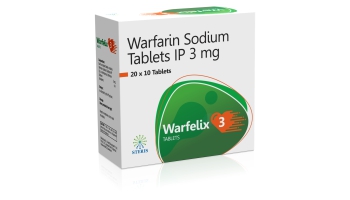Warffarin Sodium 3 mg
Jul 02, 2022
warfarin 3 mg
When you're prescribed a warfarin 3 mg tablet, you're stepping into a vital phase of treatment that helps manage your blood’s clotting ability. Warfarin 3 mg, available under the trusted brand name WARFELIX 3, is an anticoagulant (commonly known as a blood thinner) that plays a crucial role in preventing serious health issues like strokes, deep vein thrombosis (DVT), pulmonary embolism, and heart attacks caused by blood clots.
Understanding how warfarin 3 mg works, how to take it safely, and what to expect can empower you to manage your condition more confidently. In this blog, we’ll walk you through everything you need to know about WARFELIX 3, from a patient’s point of view — because informed care is the best care.
What is Warfarin 3 mg Tablet?
WARFELIX 3 contains Warfarin Sodium 3 mg, a medication that helps prevent the formation of harmful blood clots. Warfarin works by blocking the effects of vitamin K, a key nutrient your body needs to make clotting proteins. By limiting clotting factors, warfarin ensures your blood flows smoothly, reducing the risk of clot-related conditions, especially for those with atrial fibrillation, artificial heart valves, or a history of clots.
Unlike painkillers or antibiotics that offer quick relief, warfarin requires consistency, routine monitoring, and a strong partnership between you and your healthcare provider to be most effective.
Why Are You Prescribed WARFELIX 3?
Doctors prescribe warfarin 3 mg tablets for various medical conditions where the risk of blood clots is high, such as:
-
Atrial fibrillation – an irregular heartbeat that increases the risk of stroke
-
Mechanical heart valves – to prevent clots forming on the artificial valve
-
Deep vein thrombosis (DVT) – to stop clots forming in the legs
-
Pulmonary embolism – to prevent clots in the lungs
-
Post-surgical blood clot prevention, especially after joint replacements
If left untreated, these clots can travel through the bloodstream and block vital arteries, leading to life-threatening events. That’s why doctors rely on warfarin therapy to keep clotting under control.
How to Take Warfelix 3 Correctly
Taking WARFELIX 3 the right way ensures it works effectively and keeps your risk of side effects low:
-
Take it exactly as prescribed—usually once a day, at the same time.
-
Do not skip or double the dose if you miss one; consult your doctor immediately.
-
Regular INR (International Normalized Ratio) blood tests are essential to monitor how fast your blood is clotting. Your dose may be adjusted accordingly.
-
Avoid sudden dietary changes, especially foods rich in vitamin K (like spinach, broccoli, kale) which can affect how warfarin works.
-
Inform your doctor about all medications, supplements, or herbal products you use, as many can interact with warfarin.
Consistency is key. Keep all appointments, and don’t hesitate to ask your healthcare provider questions if anything feels unclear.
Possible Side Effects of Warfelix 3
While WARFELIX 3 is highly effective, it may cause some side effects. Most patients tolerate it well under proper supervision. Common side effects include:
-
Bruising easily
-
Prolonged bleeding from minor cuts
-
Nosebleeds or bleeding gums
-
Dark or bloody stools
-
Unusual tiredness
Seek immediate medical attention if you notice signs of serious bleeding such as:
-
Severe headache or dizziness
-
Sudden shortness of breath
-
Vision changes
The goal of your doctor is to maintain a balance—enough warfarin to prevent clots, but not so much that it causes excessive bleeding.
Why Choose WARFELIX 3 from Steris Healthcare?
Choosing the right brand of medication is just as important as taking the right dose. WARFELIX 3, formulated and manufactured by Steris Healthcare Pvt. Ltd., reflects high-quality pharmaceutical standards with a strong commitment to patient care.
Steris Healthcare is a WHO-GMP certified company known for its precision, transparency, and strict quality control. When you're dealing with a sensitive medication like warfarin 3 mg, consistency in formulation and trusted manufacturing processes are non-negotiable. WARFELIX 3 offers:
-
Pharmaceutical-grade raw materials
-
Accurate dosage release
-
Backed by expert R&D and trusted by doctors nationwide
With Steris, you're not just getting a product—you’re getting peace of mind.
Living with Warfarin: Patient Tips
Managing your condition with WARFELIX 3 means being aware of your body, diet, and medication routine:
-
Maintain a consistent diet, especially regarding vitamin K-rich foods.
-
Avoid over-the-counter NSAIDs like ibuprofen unless approved by your doctor.
-
Keep your INR levels within the target range by never missing a blood test.
-
Use a pill organizer or app reminders to stay consistent with your daily dose.
-
Wear a medical alert ID that indicates you're on warfarin, especially during emergencies.
A little awareness goes a long way in staying safe and healthy while on anticoagulants.
Final Words: Taking Control of Your Clot Risk with WARFELIX 3
WARFELIX 3, a trusted warfarin 3 mg tablet, gives you a proactive way to prevent dangerous blood clots. From atrial fibrillation to post-surgical care, it plays a critical role in your long-term well-being. But its success depends on patient consistency, regular monitoring, and choosing a brand you can rely on.
That’s where Steris Healthcare steps in—offering you a product designed with safety, science, and stability in mind. With WARFELIX 3, you’re not just managing your risk—you’re taking charge of your health.
Talk to your doctor, stay informed, and choose quality. Choose WARFELIX 3.
Recent Post

Light Moisturising Cream for Face – EUROSOFT MOIST CREAM

Trazodone Hydrochloride 100 mg and 50 mg Tablets for Depression

Baclofen Tablet | Uses, Dosage, Side Effects & Benefits

How Remogliflozin 100 mg Helps Lower Blood Sugar & Aid Weight Loss

Antioxidant Therapy in Chronic Conditions: Clinical Value of STYLECYSTIN ENDO

rosuvastatin ezetimibe tablet : uses, benefits, dosage, side effects

How Citicoline and Piracetam Work Together for Brain Power

How to Apply Clindamycin Nicotinamide Gel Correctly

Best Keratin and Biotin Shampoo for Men & Women | DANDROPHYTE

How Ferric Pyrophosphate Syrup Boosts Hemoglobin Faster Than Regular Iron

